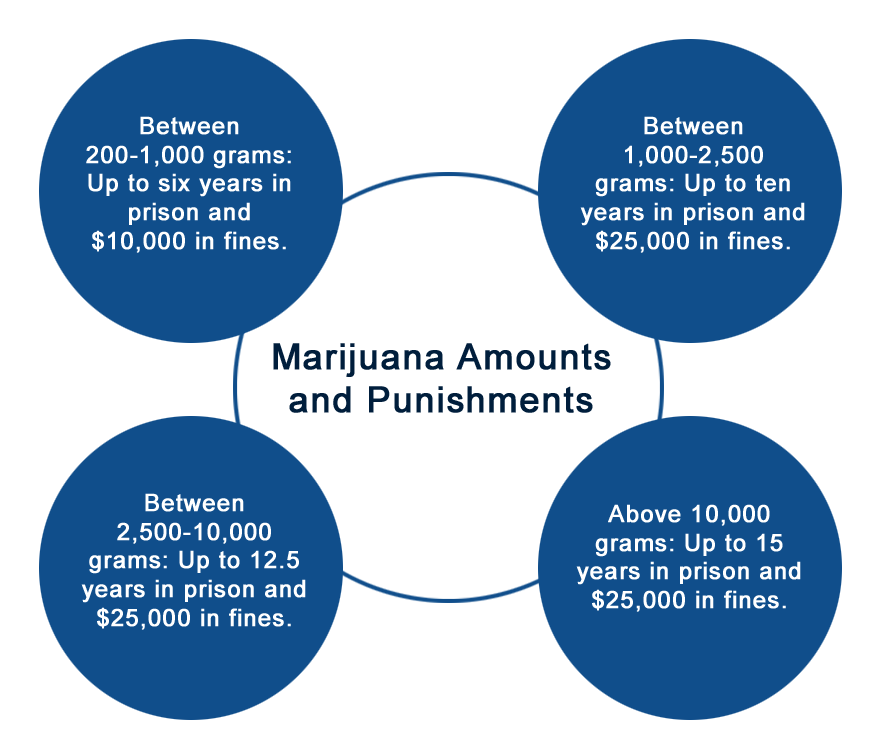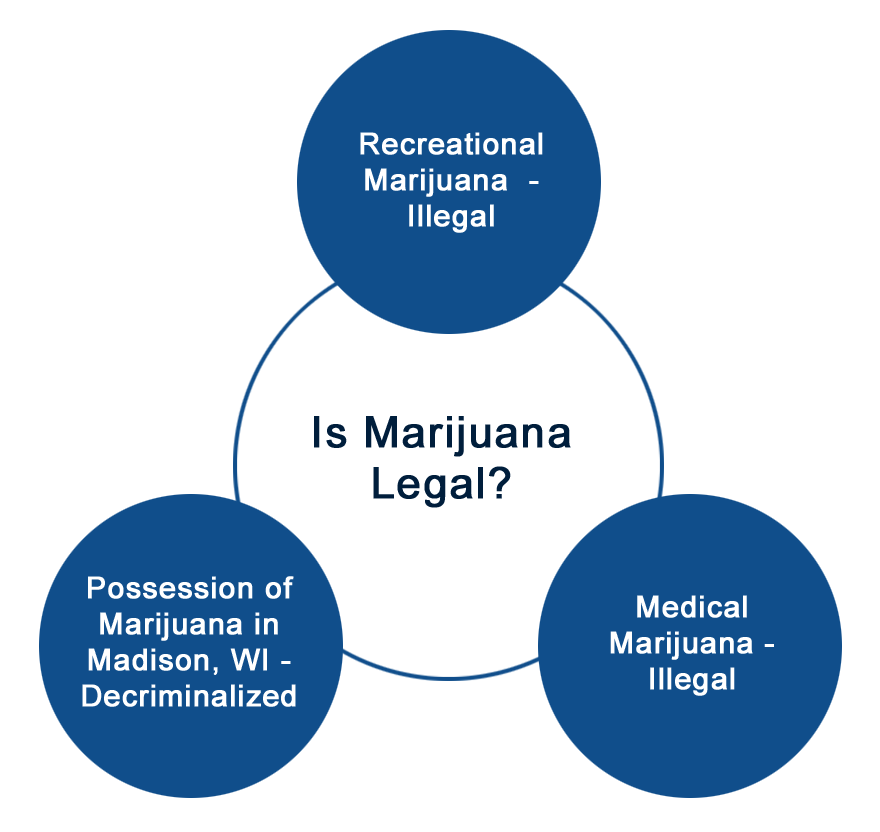
Wisconsin Marijuana and THC Laws
While there have been attempts in recent years to decriminalize, and possibly legalize, marijuana in Wisconsin, at this time it is still considered a Schedule I controlled substance. A drug’s legal “schedule” number is based on the abuse rate, with marijuana considered schedule 1 as a drug with no currently accepted medical use and high rates of potential abuse. CBD and Delta-8 THC are legal in Wisconsin, provided they are derived from hemp and contain less than 0.3% Delta-9 THC. These products are available for purchase under specific regulations.
While Wisconsin’s marijuana prohibitions are some of the toughest in the country, one individual jurisdiction has slightly more lenient laws in place. In Madison, they have taken the step of decriminalizing possession of up to 28 grams. Within Madison city limits, you are allowed to use or possess less than that amount as long as you have the permission of the owner, landlord or tenant of the property where you possess it. There are some exceptions – possession is banned within 1,000 feet of a school or on a school bus, and smoking marijuana is prohibited in areas where smoking tobacco is banned.
These are just a few basics; every encounter with law enforcement carries its own unique circumstances. You can click here to see a few exceptions that could affect you.
Wisconsin’s Marijuana Laws: Your Questions Answered
- • What About Medical Marijuana?
As stated, marijuana is illegal in Wisconsin both recreationally and medicinally.
Although there have been medical marijuana bills presented to the legislature, no laws have changed as of yet.
- • What Happens If I Cross the Border into a State Where Marijuana Is Legal?
Purchasing legal marijuana for legal or recreational purposes outside of Wisconsin’s border does not give you the legal right to bring it back into the state. In fact, the act of transporting marijuana over the border is a federal offense. These charges are prosecuted by the US Attorney’s office, and while they generally defer to state prosecutors, they can still file charges against you that could lead to potentially 5-10 years in prison.
- • Are the Marijuana Laws Different on Federal Land in Wisconsin?
Under federal law, possession of any amount of marijuana on any land owned by the government or National Park Service is prohibited. This includes parks, preserves, rivers and monuments, and more. Under the tenets of the Controlled Substances Act, even a small amount is considered a federal offense with minimum mandatory jail time.
How long does a Marijuana Charge Stay on Your Record in the State of Wisconsin?
The short answer is forever. For the rest of your life, your criminal record will reflect a conviction, regardless of any changes to the laws that occur after. As such, it is crucial that you recruit an attorney to have these charges reduced or dismissed.
- • What Are the Typical Consequences for First Offense Possession?
On non-federal land, those charged with their first count of possession can expect to face misdemeanor charges and penalties including up to six months in jail and $1,000 in fines. You will also potentially lose your driving privileges for up to five years, and if you are a student, you might find yourself ineligible for scholarships and financial aid. These charges apply to those who are found in possession of 200 grams or less in any form, be it a small baggie, edibles, etc.
 • What If I am Found in Possession of More Than 200 Grams?
• What If I am Found in Possession of More Than 200 Grams?
The consequences get steeper the more marijuana you possessed at the time of the arrest:
– Between 200-1,000 grams: Up to six years in prison and $10,000 in fines.
– Between 1,000-2,500 grams: Up to ten years in prison and $25,000 in fines.
– Between 2,500-10,000 grams: Up to 12.5 years in prison and $25,000 in fines.
– Above 10,000 grams: Up to 15 years in prison and $25,000 in fines.
- • What If I am Found in Possession of Paraphernalia?
Referring to essentially anything used in the consumption, production or transportation of drugs, “drug paraphernalia” is an extremely broad term. One common item considered paraphernalia would be a pipe – it’s not illegal if you smoke tobacco from it, but it is if you smoke marijuana from it. In most cases, it’s not the item itself, it’s what you’re using it for. Possession of marijuana paraphernalia is a misdemeanor offense in Wisconsin, with a possible jail sentence of 30 days and a maximum fine of $500.
- • What Are the Consequences if This Isn’t My First Offense?
Under Wisconsin state law, any second, third or subsequent offense is considered a class I felony. As such, you can expect up to 3 and a half years in prison and a fine of up to $10,000. Beyond that, a second felony conviction will mean the loss of your right to a firearm and the loss of voting rights until your sentence is completed.
- • What About “Intent to Distribute” Charges?
Reserved for those found to be in possession of more than 200 grams of marijuana or TCH concentrate, “intent to distribute” charges carry mandatory prison sentences of 3 and a half years to 15 years and fines from $10,000-$50,000. These will vary based on the amount in your possession when you are arrested.
- • Are Synthetic Cannabinoids Illegal in Wisconsin?
Regardless of what name or brand it is sold under brands names like K2 or Spice, synthetic marijuana is considered part of a class known as synthetic cannabinoids and is prohibited to sell, use or own in Wisconsin. Penalties include jail time for up to six months or longer and fines as high as $1,000 for a first offense. A second or subsequent conviction would be considered a class I felony, carrying a prison term as long as 3 years or more and fines as high as $10,000.
- • Is There a Possession Limit for CBD?
A non-psychoactive compound derived from cannabis, cannabidiol (CBD) does not contain THC, the chemical in marijuana that causes a high sensation. As it stands, Wisconsin currently has no legally defined possession limit on CBD products. If you do possess a product that is over 0.3% THC, it could be deemed illegal by law enforcement.
- • How Can Law Enforcement Tell If It’s CBD?
There are multiple CBD products out there, from oils and gummies to actual plant buds, that might be virtually indistinguishable from illegal marijuana. There is currently no field test that can tell the difference between the two, and in fact no tests at all that can precisely measure the amount of THC or CBD in cannabis. The sight and smell of marijuana has been the cornerstone of establishing probable cause by police, but thanks to the similarities between legal CBD products and illegal cannabis, law enforcement can mistakenly arrest citizens.
- • What About Vape Pens, Oils, Dabs or Wax?
Regardless of the form it takes, any kind of THC concentrate is considered a schedule 1 drug by the state of Wisconsin, with the same penalties as marijuana. Namely: 6 months in jail and a maximum $1,000 fine for the first offense and up to 3 and a half years in jail and $10,000 in fines for subsequent offenses.
- • How Can a Criminal Defense Attorney Fight These Charges?
Your attorney will start by getting all of the facts from you, and then digging further into the evidence to find cracks in the case against you. Using these findings, they can show that you were not in possession of the substances or didn’t know about them, that the substances in question were legal, or that law enforcement errors should lead to dropping the charges.
If you are charged with possession of marijuana, you may be fearful that you’ll be found guilty and have a permanent mark on your criminal record. But we will work to aggressively pursue the best possible outcome for you. We will work with you, empowering you to make the best decisions and then executing those decisions to keep this charge from affecting the rest of your life.
Please read through our case wins and schedule a free, no-obligation consultation with the attorneys at Tracey Wood and Associates to better understand how your charges can be contested. After talking with us, you will divorce that there are many more options available to you, which will help you sleep better tonight.
Featured in The Media




Call (608) 490-5779 or Schedule a Free Case Evaluation Online



